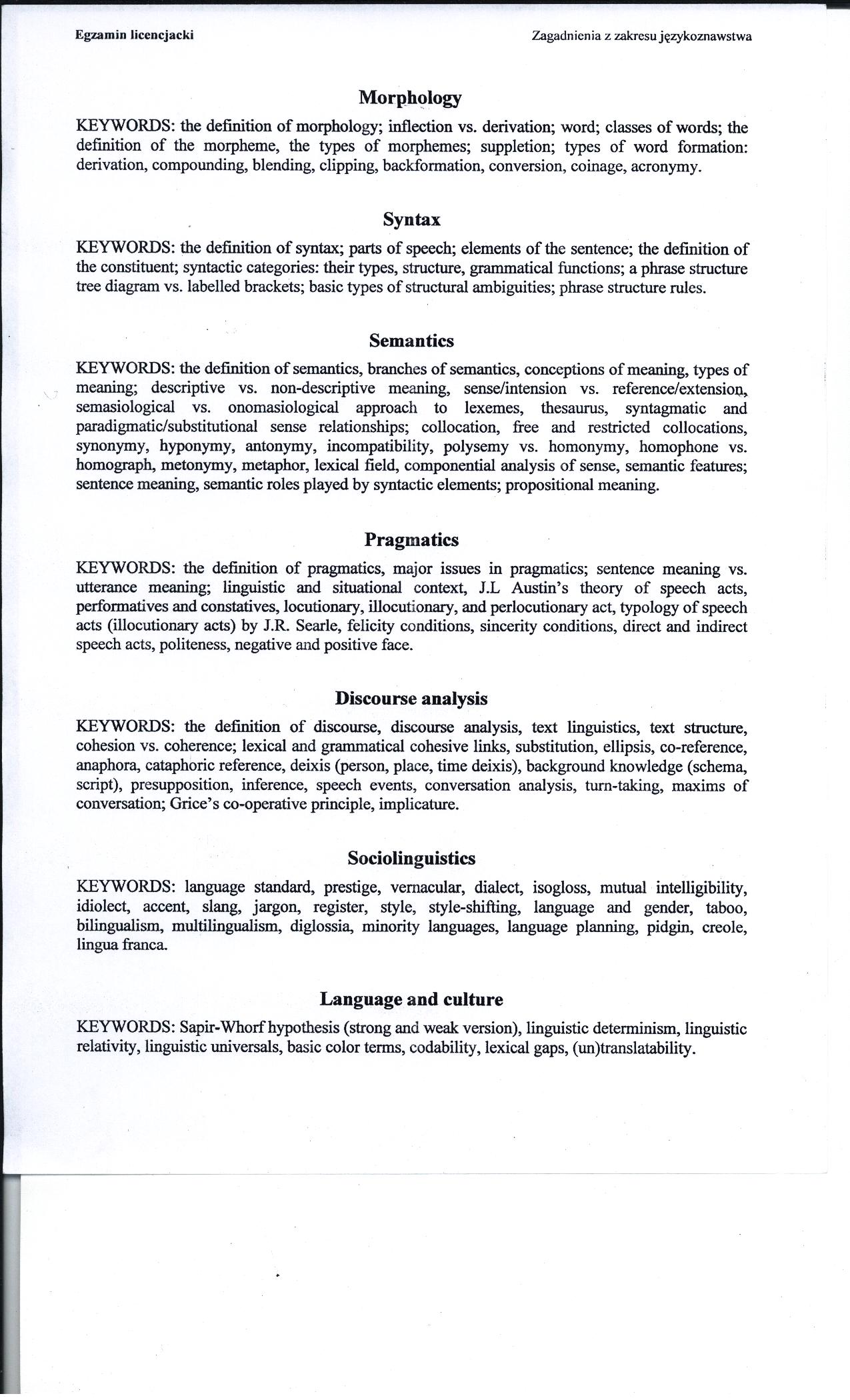Jŕzykoznawstwo licencjat 1

Egzamin licencjacki Zagadnienia z zakresu językoznawstwa
Morphology
KEYWORDS: the definition of morphology; inflection vs. derivation; word; classes of words; the definition of the morpheme, the types of morphemes; suppletion; types of word formation: derivation, compounding, blending, clipping, backformation, conversion, coinage, acronymy.
Syntax
KEYWORDS: the definition of syntax; parts of speech; elements of the sentence; the definition of the constituent; syntactic categories: their types, structure, grammatical functions; a phrase structure tree diagram vs. labelled brackets; basie types of structural ambiguities; phrase structure rules.
Semantics
KEYWORDS: the definition of semantics, branches of semantics, conceptions of meaning, types of meaning; descriptive vs. non-descriptive meaning, sense/intension vs. reference/extension, semasiological vs. onomasiological approach to lexemes, thesaurus, syntagmatic and paradigmatic/substitutional sense relationships; collocation, free and restricted collocations, synonymy, hyponymy, antonymy, incompatibility, polysemy vs. homonymy, homophone vs. homograph, metonymy, metaphor, lexical field, componential analysis of sense, semantic features; sentence meaning, semantic roles played by syntactic elements; propositional meaning.
Pragmatics
KEYWORDS: the definition of pragmatics, major issues in pragmatics; sentence meaning vs. utterance meaning; linguistic and situational context, J.L Austin’s theory of speech acts, perfonnatives and constatives, locutionary, illocutionary, and perlocutionary act, typology of speech acts (illocutionary acts) by J.R. Searle, felicity conditions, sincerity conditions, direct and indirect speech acts, politeness, negative and positive face.
Discourse analysis
KEYWORDS: the definition of discourse, discourse analysis, text linguistics, text structure, cohesion vs. coherence; lexical and grammatical cohesive links, substitution, ellipsis, co-reference, anaphora, cataphoric reference, deixis (person, place, time deixis), background knowledge (schema, script), presupposition, inference, speech events, conversation analysis, turn-taking, maxims of conversation; Grice’s co-operative principłe, implicature.
Sociolinguistics
KEYWORDS: language standard, prestige, vemacular, dialect, isogloss, mutual intelligibility, idiolect, accent, slang, j argon, register, style, style-shifiting, language and gender, taboo, bilingualism, multilingualism, diglossia, minority languages, language planning, pidgin, creole, lingua franca.
Language and culture
KEYWORDS: Sapir-Whorf hypothesis (strong and weak version), linguistic determinism, linguistic relativity, linguistic universals, basie color terms, codability, lexical gaps, (un)translatability.
Wyszukiwarka
Podobne podstrony:
Jŕzykoznawstwo licencjat 3 Egzamin licencjacki Zagadnienia z zakresu językoznawstwaPsycholinguisti
Jŕzykoznawstwo licencjat 2 Egzamin licencjacki Zagadnienia z zakresu językoznawstwaThe properties
<ń e+efykaEGZAMIN LICENCJACKI 2015/2016ZAGADNIENIA Na egzamin obowiązują zagadnienia z
Edukacja geologiczno-inżynierska 77 studiach licencjackich geologią stosowaną) zagadnienia z zakresu
[SKREŚLONE] ART. 182 1. Licencję zawodową w zakresie pośrednictwa w obrocie
Specjalizacje na studiach licencjackich Biegła znajomość języków obcych - to szczególnie Cię wyróżni
P1010241 9. Postępowanie kwalifikacyjne w celu nadania licencji zawodowych w zakre
Zagadnienia , ZAKRES ZAGADNIEŃ EGZAMINACYJNYCHriz HISTORII LITERATURY STAROPOLSKIE
zagadnienia na egzamin 1. Podstawowe pojęcia z zakresu ekologii i ochrony środowis
Art. 187 Inżynier przestrzeni zurbanizowanej 1. Licencję zawodową w zakresie zarządzania
więcej podobnych podstron